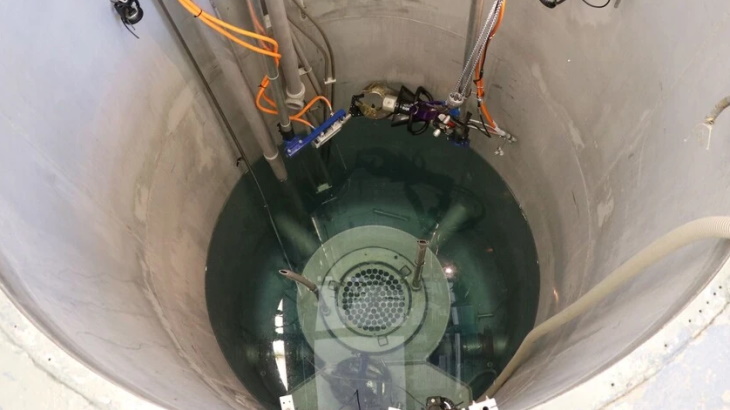Finnish research reactor decommissioned
Dismantling of the Finnish Reactor 1 (FiR1) research reactor at Aalto University's Otaniemi campus in Espoo has been completed, marking the first nuclear reactor to be decommissioned in Finland. The experience gained will serve as a model for decommissioning commercial nuclear reactors in the country.

Decommissioning of FiR1 (Image: VTT)
The FiR1 water-cooled, pool-type TRIGA Mark II research reactor was commissioned by the Helsinki University of Technology in 1962. The reactor was originally built for research and education and later also for isotope production and radiotherapy. Operational responsibility for the reactor was transferred to VTT Technical Research Centre of Finland in 1971. Although licensed to operate until 2023, VTT decided in 2012 to stop the use of FiR1 for financial reasons. The reactor - with a thermal capacity of 250 kW - was run for the last time on 30 June 2015. In 2017, VTT submitted an application for permission from the Council of State to decommission the reactor. The decommissioning licence was issued in 2021.
In early 2020, a significant milestone was reached when the used fuel from FiR1 was transferred to the USA for further utilisation. A total of 103 used nuclear fuel rods, weighing approximately 300 kilograms, were removed from the reactor.
In April 2020, Finnish utility Fortum was awarded a contract by VTT to decommission FiR1. The contract followed the signing in December 2018 of a letter of intent by Fortum and VTT to cooperate in the decommissioning of the reactor.
Fortum began dismantling the reactor in June 2023 and concluded the work in April 2024. Fortum's works on the project will continue with the final disposal of waste in the Loviisa nuclear power plant's final repository for low and intermediate-level radioactive waste. A total of about 60 cubic metres of this waste, mainly concrete, was generated from the reactor's dismantling. A six-metre-high water tank and a two-metre-thick concrete shell surrounded the reactor.
"The dismantling phase was very swift, thanks to thorough planning and preparatory work," said Markus Airila, VTT's principal scientist, who led the project and served as the decommissioning manager. "Additionally, it was crucial that we could leverage the strong nuclear safety culture and expertise from Fortum's Loviisa nuclear power plant. Fortum handled everything safely, efficiently, and on schedule without significant delays."
Antti Ketolainen, Fortum's director in charge of the project, added: "We gained a lot of lessons and experience from the FiR1 project, which we can use to develop our operations and support our service business customers, for example, in preparing decommissioning plans and cost estimates."
According to VTT, despite the small size of the reactor, the FiR1 decommissioning project will "domestically serve as a model for decommissioning commercial nuclear reactors and created new expertise for the benefit of VTT's and Fortum's international customers".
It added: "The process of decommissioning a nuclear reactor has now been comprehensively tested in Finland for the first time, taking into account the perspectives of various stakeholders. Significant actions were taken during the process, such as establishing a national waste management mechanism. Administratively, the same measures were implemented as would be required for decommissioning a large reactor."
Alongside the FiR1 project, VTT, in collaboration with several Finnish partners, also executed the dECOmm development project funded by Business Finland. This project used the decommissioning project as a test platform for various applicable technologies and has successfully achieved its initial goal of exporting technology.
The total cost of decommissioning FiR1 is put at about EUR24 million (USD26 million), pre-funded by the Finnish Nuclear Waste Management Fund.
Researched and written by World Nuclear News
- China Institute of Atomic Energy
- Nuclear Power Institute of China
- Southwestern Institute of Physics
- China Nuclear Power Operation Technology Corporation, Ltd.
- China Nuclear Power Engineering Co., Ltd.
- China Institute for Radiation Protection
- Beijing Research Institute of Uranium Geology (BRIUG)
- China Institute of Nuclear Industry Strategy (CINIS)
- China Nuclear Mining Science and Technology Corporation


